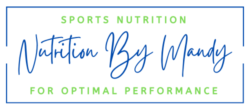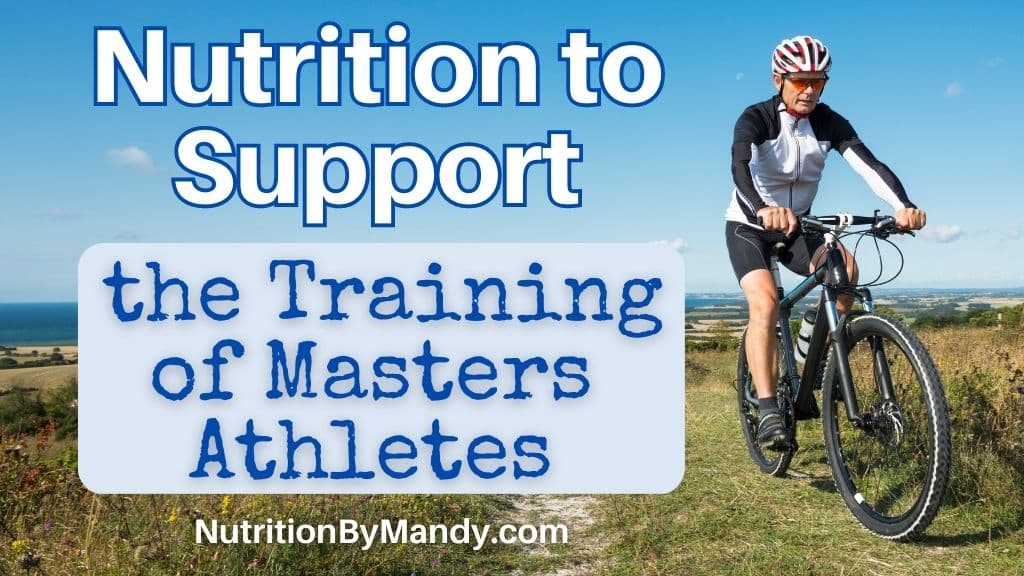Nutrition to Support the Training of Masters Athletes
It is important for masters athletes to know what to eat to support health, training, and performance. Let’s take a look at the nutrition needs of masters athletes. We will then explore key nutrients masters athletes should focus on in their sports nutrition meal plan.
Carbohydrates to Support Masters Athletes Training
Carbohydrates are important to support the training of masters athletes. Dietary carbohydrates provide the body with energy for activity. During exercise, the body’s carbohydrate stores become depleted. Therefore, consuming adequate carbohydrates in the diet is important for masters athletes.
Healthy Carbohydrate Options
Masters athletes should include healthy sources of carbohydrates as the foundation of their sports nutrition meal plan. Foods that provide carbohydrates include:
- Whole grains
- Fruit
- Starchy vegetables
- Beans and legumes
- Milk and yogurt
In addition to carbohydrates, whole grains, fruits, vegetables, beans, and legumes provide the body with fiber, vitamins, and minerals.

Fiber for Masters Athletes
Fiber is an important part of a well-balanced diet for masters athletes. Consuming an adequate amount of fiber in the diet is associated with many positive health benefits. Diets high in fiber are associated with a reduced risk of developing many chronic diseases, including (1):
- Coronary heart disease
- Stroke
- Hypertension
- Diabetes
- Obesity
The Institute of Medicine (2) provides recommendations for adequate fiber intake that vary based upon both age and gender. The adequate intake for males and females 51 years of age and older are listed below.
- Males ≥ 51 years of age: 30 grams/day
- Females ≥ 51 years of age: 21 grams/day
Sources of Dietary Fiber
To ensure adequate fiber intake, masters athletes should include fiber-rich foods in their diet. Foods that contain fiber include:
- Whole grain bread, bagels, wraps, and English muffins
- Brown rice, whole wheat pasta, quinoa
- Oatmeal and whole grain breakfast cereal
- Beans, legumes, chickpea pasta
- Chia seeds and flaxseeds
- Fruits and vegetables
- Avocados

Carbohydrates to Support Masters Athletes Training and Performance
Similar to younger athletes, the carbohydrate needs of masters athletes are dependent upon both the intensity and the duration of the activity. Athletes participating in activities of a higher intensity or a longer duration require more carbohydrates to fuel the body (3).
For example, a masters athlete participating in a skill-based sport, such as golf, will need less carbohydrates in their diet plan than an athlete training for an endurance event.
Masters athletes should select low-fiber carbohydrates that provide a quick source of energy to enjoy before and during competition. Consuming foods high in fiber, too close to the competition, may lead to GI distress during the event (3).
Protein to Support Masters Athletes Training
In general, individuals lose muscle mass as they age. This loss of muscle is associated with a decline in strength as well as mobility (4). Promoting the maintenance and building of lean muscle mass is essential for masters athletes.
For these reasons, protein is an important nutrient in the training diet of masters athletes. Compared to younger athletes, masters athletes require a greater amount of protein to stimulate muscle growth (5).
Athletes are encouraged to spread their protein intake throughout the day with several meals and snacks (6). Masters athletes should aim to eat ~0.4 grams of protein per kg body weight at each eating occasion – compared to 0.25 grams for younger athletes (5). For a 175-pound masters athlete this calculates to be ~32 grams of protein per meal.
Lean Protein Sources
Ideas for sources of lean protein masters athletes can enjoy in their diet include:
- Chicken, turkey, seafood, pork, lean cuts of red meat, eggs
- Milk, cottage cheese, cheese, Greek yogurt
- Beans and legumes
- Nuts and nut butters
- Soy milk, tofu, edamame, seitan
Plant-Based Protein Sources
Athletes following a vegetarian or vegan diet can meet their protein needs through plant-based food sources, such as beans, legumes, nuts, nut butters, soy, and tofu. However, careful planning of plant-based meals is important to ensure athletes consume adequate protein and essential nutrients in their overall sports nutrition meal plan.

Dietary Fat for Masters Athletes
Dietary fat has many important roles in the body and is an important part of the diet for masters athletes. Fat is necessary for the absorption, transportation, and storage of fat-soluble vitamins (Vitamins A, D, E, K). Fat helps provide protection for our internal organs and insulation for the body.
Omega-3 Fatty Acids
Omega-3 fatty acids are a type of unsaturated fat that the body cannot produce. They are found in fatty fish, as well as flaxseeds, chia seeds, walnuts, and plant oils (7).
Omega-3 fatty acids have many important roles in the body, such as supporting optimal brain health and cardiovascular function, as well as helping to reduce inflammation in the body. Since the body cannot produce omega-3 fatty acids, they must be consumed in the diet.
Healthy, Unsaturated Fats
Ideas for foods containing healthy, unsaturated fats that masters athletes can add to their sports nutrition meal plan include:
- Avocados
- Nuts, nut butters, seeds
- Fatty Fish: Salmon, tuna, herring, sardines, mackerel
- Olives and olive oil
- Liquid vegetable oils: Canola, corn, soybean, safflower, sunflower

Limit Saturated Fat in the Diet
In addition to choosing healthy unsaturated fats, masters athletes should limit saturated fats in their diets. Diets high in saturated fats can raise LDL (bad) cholesterol levels, thus increasing the risk of developing heart disease.
Foods high in saturated fats include:
- Red meat, pork, poultry (with skin)
- Fried foods
- Cream, butter, full-fat cheeses
- Coconut and palm oils
Anti-Inflammatory Foods for Masters Athletes
A well-planned sports nutrition diet for masters athletes should also include foods that can help reduce inflammation in the body. In addition to foods containing omega-3 fatty acids, foods with anti-inflammatory benefits include:
- Leafy Greens: Spinach, kale, arugula, romaine lettuce, and Swiss chard
- Berries: Strawberries, blueberries, blackberries, raspberries
- Tart cherries
- Herbs and Spices: Garlic, ginger, turmeric, rosemary, and cinnamon
Hydration to Support Masters Athletes Training
Hydration is an area of key importance for masters athletes. As individuals age, they experience a reduced sensitivity to thirst in response to a lack of fluid intake. This places older individuals at an increased risk for becoming dehydrated (8).
Compared with younger athletes, older individuals also have a slower response to excreting excess water and sodium from the body. Retaining fluid can increase the risk of hyponatremia, while sodium retention can lead to concerns with elevated blood pressure (8).
Individualized Hydration Plan for Masters Athletes
Masters athletes should work with a sports dietitian nutritionist to develop an individualized hydration plan to support both training and performance. This is particularly important for masters athletes following a low-sodium diet or who have been advised to restrict their fluid intake.
Factors that will be considered when developing the individualized hydration plan include:
- Type of exercise
- Intensity and duration of the exercise
- Climate – Temperature and humidity
- Medications that may impact fluid status (i.e., diuretics)
It is important masters athletes take time to determine their individual fluid needs to prevent either dehydration or overhydration from occurring during activity (8).
Supporting Bone Health for Masters Athletes
Including adequate Vitamin D and calcium in the diet of masters athletes is important to support bone health. The recommended dietary allowance (RDA) for both of these nutrients increases as individuals age.
Vitamin D for Masters Athletes
Vitamin D is a fat-soluble vitamin the body can naturally produce when the skin is exposed to UV sunlight. However, as individuals age, the skin has a decreased ability to produce Vitamin D (9).
Vitamin D can also be obtained in the diet from:
- Milk fortified with Vitamin D
- Cod liver oil, trout, salmon
- Mushrooms exposed to UV light
- Fortified breakfast cereals
- Fortified plant-based milks
The RDA for Vitamin D for individuals 70 years and younger is 600 IU per day. The RDA increases to 800 IU per day for individuals over the age of 70 (2).
Masters athletes should consider visiting with their physician to have their Vitamin D levels assessed. If deficient in Vitamin D, an appropriate plan for supplementation can be determined.

Calcium for Masters Athletes
Similar to Vitamin D, calcium is important in the diet of masters athletes to promote bone health. Calcium can be obtained in the diet from a variety of sources, including:
- Milk, yogurt, cheese, cottage cheese
- Calcium-fortified orange juice
- Plant-based milk
- Tofu, soybeans
- Sardines
The recommended dietary allowance of calcium for females age 51 and older is 1,200 mg/day. For males, the RDA is 1,000 mg for individuals under the age of 70 and 1,200 mg/day for men age 70 years and older (2).
Masters athletes should visit with a physician or a sports dietitian nutritionist regarding their dietary consumption of calcium and recommendations for increasing intake if needed.

Nutrition to Support Masters Athletes Training
You are now set with ideas for key nutrients that masters athletes should focus on including in their diet. For an individualized sports nutrition meal plan, consider visiting with a sports dietitian nutritionist who can create a plan specific to your needs.
For additional sports nutrition tips to support masters athletes, check out my blog: Easy High-Fiber Breakfast Ideas for Athletes.
Join the Nutrition By Mandy Email List & Get a Free Athlete’s Grocery List
Click HERE to join the Nutrition By Mandy e-mail list. When you join you will receive a free athlete’s grocery list to print and take with you to the store.
About the Author
Mandy is a Sports Dietitian Nutritionist in the San Antonio, TX area. She is a Registered and Licensed Dietitian, a Board-Certified Specialist in Sports Dietetics, a Licensed Athletic Trainer, and is a Certified Exercise Physiologist through the American College of Sports Medicine. Mandy has experience working with athletes at the high school, collegiate, and professional levels. She believes the key to reaching one’s full potential, both in everyday life and in sports performance, relies on a healthy nutritional foundation. Learn more about the work Mandy does here.

